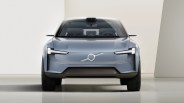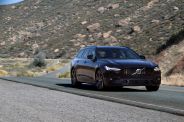Volvo has a change coming this decade. And it may be even more of a shock than converting to 100% electric powertrains by 2030. Volvo has used minimalist alphanumeric nomenclature for its cars throughout its existence. The big radical shift came in the 1990s when Volvo switched from three-digit (Volvo 240) to the current letter plus two-digit (S60, V90) labeling.
According to Autocar, however, Volvo is plotting a “new beginning” for its conversion to EVs with “emotional” names. Volvo CEO Håkan Samuelsson told them the successor to the XC90 would have a “name, like a child” and the practice would continue moving forward.
“We’re talking about a totally new architecture, a new-generation of born-electric, all-electric cars with central computing,” Samuelsson told Autocar. “It’s good and clear to mark that this is a new beginning, and that’s why we’re not going to have numbers and letters, an engineering type of name. We’re going to give them a name as you give a newborn child a name.”
Volvo is moving counter to the prevailing trend. Manufacturers that use model names like Volkswagen with the ID.4, Hyundai with the Ioniq 5 and Kia with the EV6 have all gone alphanumeric for EVs to highlight the engineering involved. And BMW and Mercedes have incorporated their new EVs within their existing nomenclature.
However, Volvo’s departure from tradition may prove fitting. Volvo is a flashier, more luxurious brand than it once was, and it’s poised to move even further upmarket. And they are going to be focused on selling vehicles in new markets like China. Cadillac, attempting a similar trick with its own EV conversion, is moving vehicles back to model names too. Escalade sounds a bit more premium than XT8.
Of course, even if the decision to switch to model names is correct, you still have to come up with good ones, which is a potential pitfall that alphanumeric nomenclature eliminates.



